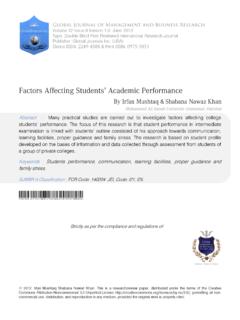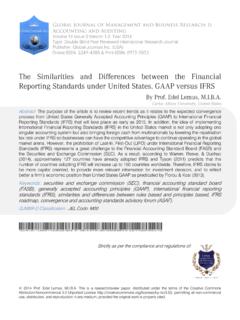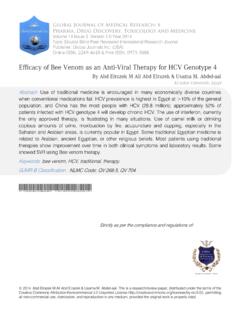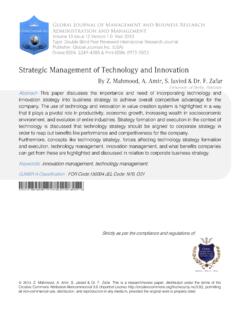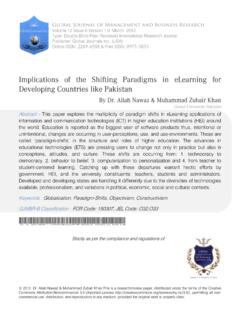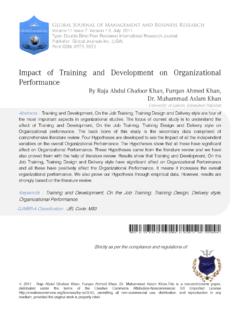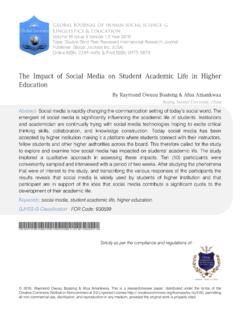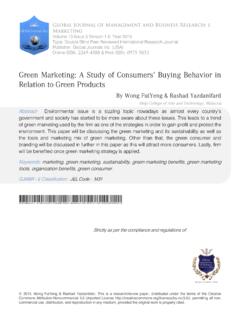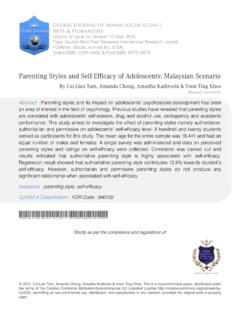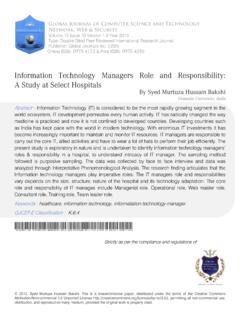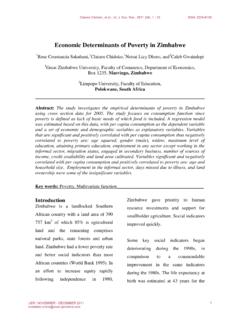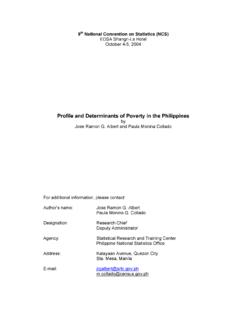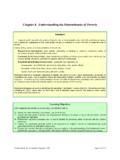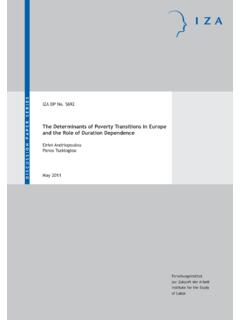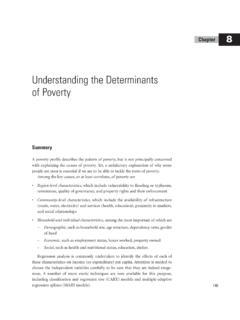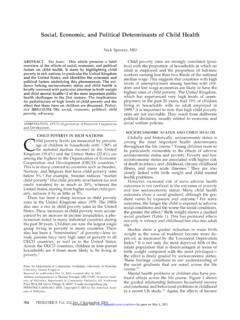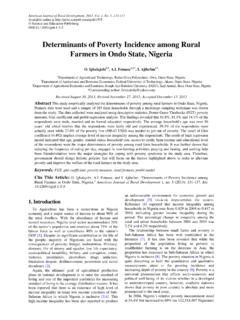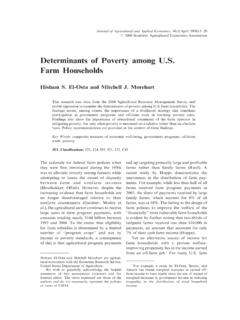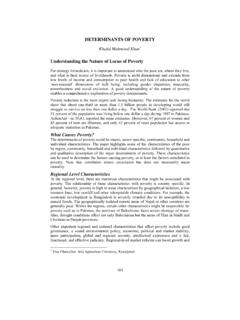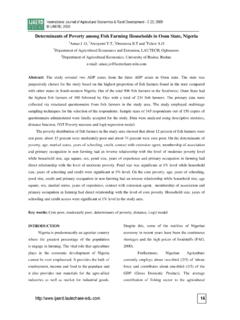Transcription of Determinants of Rural Income Poverty in Ethiopia: Case ...
1 2015. Muhdin Muhammedhussen. This is a research/review paper, distributed under the terms of the Creative Commons Attribution-Noncommercial Unported License ), permitting all non-commercial use, distribution, and reproduction in any medium, provided the original work is properly cited. Global Journal of Management and Business Research: B Economics and Commerce Volume 15 I ssue 11 Version Year 2015 Type: Double Blind Peer Reviewed International Research Journal Publisher: Global Journals Inc. (USA) Online ISSN: 2249-4588 & Print ISSN: 0975-5853 Determinants of Rural Income Poverty in Ethiopia: Case Study of Villages in Dodola District By Muhdin Muhammedhussen Jimma University, Ethiopia Abstract- The main objective of this study is to ascertain the socio-economic Determinants of Income Poverty in Rural areas of Ethiopia.
2 A Simple random sampling was used to select 217 household heads from two Rural areas Dodola district, Oromia Regional State, in a year 2012. The Binary logistic method was used to find out the Determinants of Income Poverty . The result reveals that Determinants of Income Poverty include household size, number of Income sources of the household, livestock and farm land ownership. Poverty status is negatively associated with number of Income sources of the household, livestock and farm land ownership. However, family size is positively related to Poverty . Finally the study suggests the Rural households should diversify their Income sources. The households should also be effectively involved in family planning.
3 Keywords: Income Poverty , Determinants , binary logistic regression. GJMBR - B Classification : JEL Code : I32 DeterminantsofRuralIncomePovertyinEthiop iaCaseStudyofVillagesinDodolaDistrict Strictly as per the compliance and regulations of: Determinants of Rural Income Poverty in Ethiopia: Case Study of Villages in Dodola District Muhdin MuhammedhussenAbstract- The main objective of this study is to ascertain the socio-economic Determinants of Income Poverty in Rural areas of Ethiopia. A Simple random sampling was used to select 217 household heads from two Rural areas Dodola district, Oromia Regional State, in a year 2012. The Binary logistic method was used to find out the Determinants of Income Poverty .
4 The result reveals that Determinants of Income Poverty include household size, number of Income sources of the household, livestock and farm land ownership. Poverty status is negatively associated with number of Income sources of the household, livestock and farm land ownership. However, family size is positively related to Poverty . Finally the study suggests the Rural households should diversify their Income sources. The households should also be effectively involved in family planning. Keywords: Income Poverty , Determinants , binary logistic regression. I. Background and Justification of the Study overty is one of the core issues and the most widespread social problems in the world.
5 It has no geographical boundary. It is found in all directions and corners. Despite world exceptional advances in science, technology and wealth creation, Poverty in all its manifestations remains deep and persistent. Poverty is multifaceted and has no single generally accepted definition (Ibrahim and Umar, 2008). Indeed, it is multidimensional. As a result literatures on the concept of Poverty show various interpretations in economic, social, political, institutional, environmental and cultural contexts. As of World Bank (2005), Poverty is defined as a deprivation in well-being, and encompasses many dimensions. It, besides the inability to acquire the basic goods and services, consists of low levels of health and education, poor access to clean water and sanitation, inadequate physical security, voicelessness, and insufficient capacity and opportunity to better one s life.
6 O Boyle (1999) defines Poverty as a: ..problem in unmet human physical need. That is, persons and families in Poverty lack the goods and services needed to sustain and support life and the Income to purchase the goods or services which would meet those needs (Page 1). In the same way, Bradshaw (2005) expressed Poverty , generally, as a lack of necessities. Basic food, shelter, medical care, and safety are generally considered essential based on shared values of human dignity. Nevertheless, what is a necessity to one person is not equally a necessity to others. Other writers, like Lehning (2006), Frerer and Vu (2006) and Wolf (2006) also defined and expressed Poverty from their own viewpoint and field of study.
7 However, all the approaches and definitions of Poverty reveal as a state of human well being deprivation. Poverty is a threat to the world, especially developing countries. The governments, national and international development institutions have tried to understand the nature of Poverty and mechanisms of reducing it. Poverty alleviation is a key policy debate in recent development literature. Many researchers of development economics have argued that the fight against Poverty is a necessary condition for sustainable Economic growth. As stated in Oyekale (2011) Poverty reduction is the issue that reconsidered as one of the brightest indicators of human progress.
8 When we come to Ethiopia, it is one of the poorest nations in the world. The country has a long experience famine, hunger and Poverty often managed by international humanitarian agencies. The government of Federal Democratic Republic of Ethiopia has been spending large amount of money to alleviate Poverty , especially since 1991. Despite strong progress in Poverty reduction, still millions of poor people live in the country. In other words, Poverty is still a salient feature of the country. According to MoFED (2012), by the year 2010/11 around and of populations are living below Income and food Poverty line, respectively. Even if all Ethiopians suffer of Poverty , it is more sever in the Rural area than urban areas (MoFED, 2006).
9 This would bring various criminal acts if situations go beyond the limits of social tolerance. Working on anti Poverty program is pivotal. Any effective Poverty reduction intervention depends on a good targeting of P 2015 Global Journals Inc. (US)25 Global Journal of Management and Business Research Volume XV Issue XI Version IYear 2015 (B)the poor and their features. Therefore, understanding the nature, Determinants and level of Rural Poverty is a prerequisite for successful and effective government Author: Lecturer of Economics, Jimma University. e-mails: intervention to reduce deprivation in the Rural areas. With the view of that this paper examines the socio-economic Determinants of Poverty in Rural areas of Ethiopia.
10 This study will contribute to the understanding of status and sources of Poverty . Moreover, it will provide significant information for concerning bodies such as government, policy makers, and other institutions working to alleviate Rural Poverty and misery life. II. Literature Review: Socio-Economic Determinants of Poverty Poverty alleviation is a key policy debate in recent international development literature. The all inclusive development will happen when people empowered politically, socially and economically. The preparation of policies for Poverty alleviation requires a systematic knowledge of the Poverty phenomenon. With the growing interest in Poverty reduction, it is important to summarize information on Poverty and identify characteristics of the poor.
